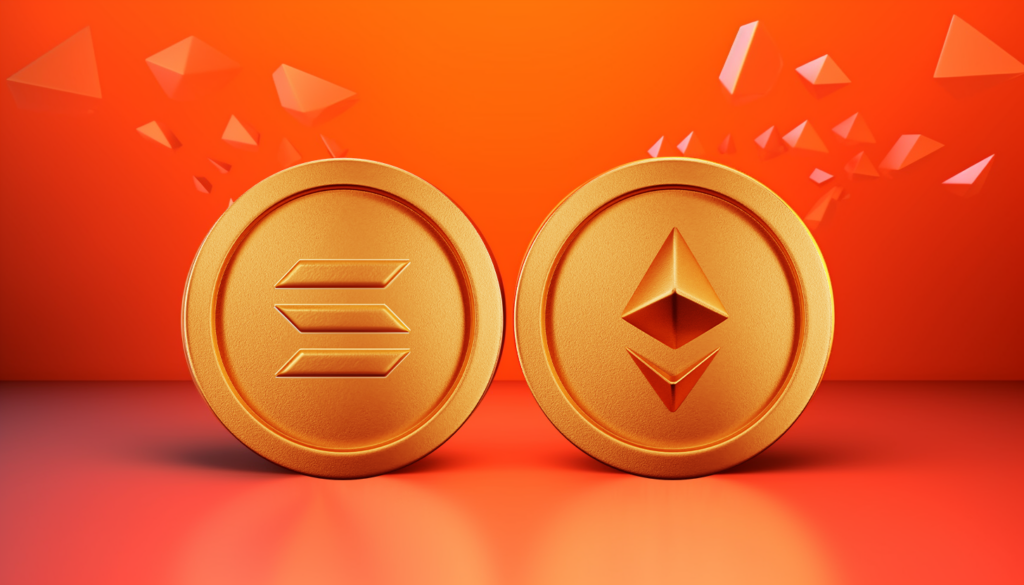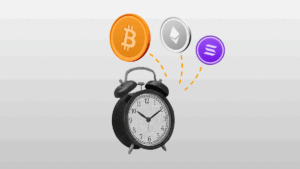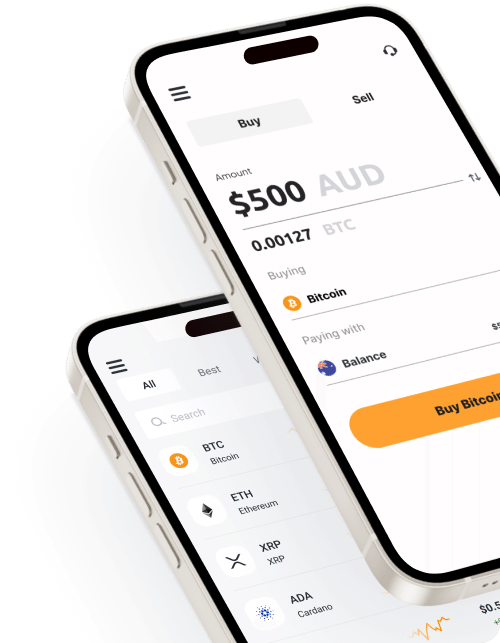
In the vast world of cryptocurrencies, two giants stand out in the realm of smart contracts and dApps (that’s short for decentralised applications, by the way!): Solana and Ethereum. Imagine these two blockchain networks different brands of smartphones, each with its own cool features, user base, and unique quirks. While Ethereum has been around for a while and is like the OG iPhone of the crypto world, Solana is like the sleek new competitor that’s turning heads. So, if you’ve ever wondered how these two compare or which one might be better for your needs, you’ve come to the right place!
Short Summary
Solana vs Ethereum: Ethereum is like the legendary band with a massive following and long-standing reputation, while Solana is the breakout star impressing everyone with speed and affordability.
- Consensus Mechanisms: Both cryptocurrencies have adopted the “proof of stake” system, a greener and more efficient method of confirming transactions, moving away from the energy-intensive “proof of work.”
Costs, Speed, and Security: While the Solana network boasts faster speeds and lower fees, Ethereum takes the lead in decentralisation and security, offering a more tried-and-true system that’s earned users’ trust over the years.
Contents
- Understanding the Ethereum Blockchain
- Understanding the Solana Blockchain
- Comparing Consensus Mechanisms
- Speed and Scalability
- Decentralisation and Security
- Costs and Fees
- Market Capitalisation and Adoption
- Summary
- Frequently Asked Questions
Understanding the Ethereum Blockchain

Ethereum is like this super cool digital playground where developers can create and run their own games (or apps) using something called “smart contracts.” Think of these smart contracts as self-executing rules—like if you do A, then B will automatically happen. The Ethereum network has been around since 2015, making it one of the OGs in the crypto scene. It’s not just about trading coins; it’s more about building a whole new digital universe. And, just like any popular game, it has tons of players (users) and developers adding new stuff all the time!
Understanding the Solana Blockchain

Imagine if Ethereum was the classic video game everyone knew and loved, and then Solana comes in like the hot new sequel with faster levels and cooler graphics. Solana is also a place where developers can build games (or, you know, apps) using smart contracts, just like Ethereum. But here’s the kicker: the Solana network claims to be super speedy and can handle loads of transactions in a jiffy without slowing down or costing you a ton in fees. Think of it like playing a game with zero lag, even if everyone in school is playing at the same time. It’s newer to the scene than Ethereum, but it’s quickly gaining fans because of its performance perks.
Comparing Consensus Mechanisms
“Consensus mechanisms” is just a fancy term for how cryptocurrencies like Solana and Ethereum agree on stuff (like confirming transactions). Think of it like a classroom vote on where to go for a field trip. In the early days, Ethereum used something called “proof of work,” which is kind of like everyone in class doing a ton of math problems to vote (yeah, super energy-consuming!). But now, both Ethereum and Solana use “proof of stake” to process transactions. In this method, instead of doing math problems, it’s like the kids with the most candy (or coins) get a bigger say in the vote. It’s way less energy-hungry and faster. Both systems have their pros and cons, but proof of stake is seen as the greener, more efficient choice, and that’s what both our crypto stars are rocking now!
Speed and Scalability

When we talk about “Speed and Scalability,” think about it like the difference between a regular skateboard and a high-speed electric one. Both can get you around, but one’s going to do it faster and can handle more bumps in the road. In the crypto world, speed means how quickly transactions happen (transaction speed), and scalability is about how a system deals when tons of people start using it at once. Even though both Ethereum and Solana use “proof of stake” (remember, that’s the cool new voting system with the candy), Solana is often praised for being the speedier skateboard. It’s designed to have very fast transaction speeds without getting clogged up. Ethereum’s no slouch, but there have been times when it got overwhelmed and slowed down, like a popular game server on launch day. Both are working hard to improve, but for now, Solana’s got the edge in the speed department.
Decentralisation and Security
Imagine a school project: if the whole grade participates, no one person can dominate or mess things up, right? This is kinda how Ethereum rolls. It’s like a big group project where loads of participants (called nodes) make sure everything’s legit. This means no single person or group has too much power. Now, Solana, on the other hand, has had instances where a smaller group (around 30 validators) held a big chunk (like 35%) of the influence. Think of it as if just a few kids in class had most of the markers and paper. There’ve been times when Solana’s system has had hiccups or outages, kind of like a game crashing unexpectedly. While Ethereum has been more like that reliable old game that rarely glitches. So, even if Solana might save you some digital coins with its lower fees, Ethereum’s been around the block and has that trusty, decentralised vibe which adds an extra layer of safety for folks investing their cash. Always good to remember: cheaper isn’t always better if you’re skipping out on some key safety features!
Costs and Fees
Think of this like choosing between two streaming services. One might have all the top shows and is super popular, but man, the monthly fee is kinda steep. The other is newer, has some cool features, and is easier on your wallet. Ethereum, being the popular kid on the block, has had moments where its transaction costs (they call them “gas fees”) shoot up like crazy, especially when everyone’s trying to use it at the same time. On the flip side, Solana tends to be the budget-friendly option with low transaction fees. It’s kinda like getting a decent streaming service for half the price. Both use “proof of stake”, which should help with costs in the long run, but for now, if you’re looking to save some digital dough, Solana might be your go-to. But, as with any deal, always check what you’re getting for the price!
Market Capitalisation and Adoption
“Market Capitalisation and Adoption” might sound super fancy, but let’s break it down. Imagine two bands: one’s been on the charts for years, has tons of loyal fans, and sells out stadiums. The other is the breakout star of the year, super hot right now, but still building its fan base. Ethereum is like that legendary band. It’s been around, has a massive value (that’s the “market capitalisation” part), and loads of people and businesses use it. Solana, the new hitmaker, is gaining fans fast and has a growing value, but it’s not quite at Ethereum’s superstar level yet. Both being on “proof of stake” means they’re keeping up with the modern beats, but in terms of sheer sise and popularity, Ethereum’s still got the bigger fan club. However, as with any new sensation, Solana’s making waves and might just surprise everyone in the future.
Summary
Let’s wrap this up! Ethereum’s been a big player in the crypto world for a while, known for its strong decentralisation, security, and huge market value. But its fees can sometimes be a bummer. On the other hand, Solana’s the newer kid on the block, impressing everyone with its speed and lower costs. However, it’s had a few hiccups with reliability. Both are using the “proof of stake” method, which is like a green, efficient way to run things. As for what the future holds? Well, both are cooking up cool upgrades to get even better. At the end of the day, they’ve both got their strengths and challenges, so it really comes down to what you value most in your crypto adventure!
Frequently Asked Questions
Will Solana surpass Ethereum?
It’s a hot topic! The crypto world is ever-evolving, and while Ethereum has held a dominant position for a while, Solana’s been making waves with its features and performance. Predicting the future of cryptocurrencies is always tricky, so it’s hard to say definitively. What’s for sure is that both have unique strengths and are pushing boundaries in their own ways.
Why use Solana instead of Ethereum?
There are several reasons one might lean towards Solana. It boasts faster transaction speeds and generally has lower transaction fees compared to Ethereum, especially during peak times. If you’re into developing applications or just making transactions, and speed and cost are your top priorities, then Solana might be a good fit for you. But, as always, it’s essential to research and figure out what suits your needs best.
What are the main differences between Ethereum and Solana?
At their core, both Ethereum and Solana allow for decentralised apps and smart contracts. But here’s a quick breakdown:
Speed: Solana often has faster transaction speeds.
Fees: Solana typically offers lower transaction fees.
Decentralisation & Security: Ethereum has a more decentralised network, which some argue provides better security.
Adoption: Ethereum, being older, has a wider user base and more applications built on its platform. Solana, while newer, is growing rapidly.
Consensus Mechanism: As of this writing, both use proof of stake, but they arrived there differently with Ethereum transitioning from proof of work.
Which platform has lower transaction fees?
Solana usually has lower transaction fees compared to Ethereum, especially during high-traffic times. This can be a significant advantage for those looking to minimise costs during transactions or when deploying applications. However, as the crypto landscape is dynamic, it’s a good idea to stay updated on fee structures and trends.



